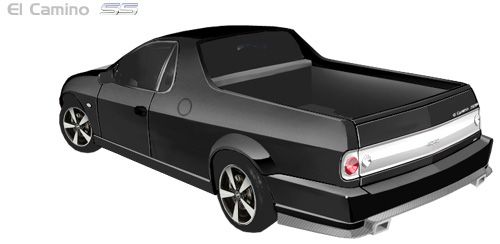Despite rumors that the importation of Holden’s Zeta platform based “ute” to the United States, based on the same platform as the forthcoming Pontiac G8, is almost a done deal – Bob Lutz says it may not happen.
It’s all about the money.
Or, the currency, anyway.
The problem is the exchange rate between the Australian dollar and the United States dollar.
"I will tell you, the business case isn't being helped by the continued strength of the Australian dollar versus the US dollar," Luts told reporters at the Frankfort Auto Show earler this week. "The pricing we would need to make it successful — the program is at the point where it might not be a sound business proposition. Or we would have to subsidize it, which we are basically not going to do. Or we would have to price it to the moon."
Though the “ute,” a truck based on a car, much as were the Chevy El Camino and Ford Ranchero produced domestically in the ‘60’s and ‘70’s, would likely not have the volume of sales expected of the Pontiac G8 on which it is based, Lutz’s remarks suggest that GM’s rear-wheel-drive passenger car program may be in trouble. That would be a problem for both GM and its Holden subsidiary.
For Holden, export of vehicles to the United States is considered crucial to the long-term profitability of the company. Current plans cal for sending about 75,000 cars per year to the U.S., which is about half of the Holden annual output.
For GM, the problem could be even bigger: GM has outsourced its domestic large car platform to Holden. Two years ago, GM cancelled domestic development of the Zeta platform, just at the point that the decision to produce it would have to have been made.
At the time, the story was that GM’s management had decided that the Zeta platform, as designed, was simply too expensive. But the company continued development of the platform at Holden, as the platform for the Australian Holden Commodore and the 2008 Pontiac G8.
There have been rumors (though there have been opposing rumors, too) that the Zeta platform would be the basis for the next versions of the Buick Lucerne, Cadillac DTS, and possibly even the Chevy Impala.
That the idea of importing the ute is serious is beyond dispute: two left hand drive utes cars are currently in Detroit for evaluation.
Also, merchandizing the vehicle has clearly been given a lot of thought. Lutz said it wouldn’t go to Chevrolet because “Chevrolet has way too much stuff in its showroom and it would get lost in there." It was expected that production plans would be announced either in December at the Los Angeles Motor Show or January at the Detroit Motor Show.
But if the exchange rate presents a problem for the “ute,” it presents a problem for the G8, too. Though it is too late to stop the G8 program, whether the platform can be used for other vehicles is another matter. GM certainly cannot afford to lose money importing cars from Australia to sell in the United States. If it cannot make money on them due to the exchange rate, despite the free-trade agreement between the United States and Australia, it has a huge problem: it will have nothing to replace the current models.
GM has long neglected the automobile side of the business to concentrate on trucks. It’s current large car line-up is primarily front-wheel-drive in a market that prefers rear-wheel-drive cars. The platforms on which its large cars are built will be a decade old by the time they were scheduled for replacement. The current Cadillac deville/DTS platform was introduced in 1999 as the new Seville/STS and the current DTS was first sold in 2000. It is not scheduled for replacement before 2010, at the earliest.
The question has implications for GM’s world-wide plans, as well. Holden is advantageously geographically positioned to sell in a number of foreign markets, including the Middle East and South America. Holden is thought to be an important part of GM’s plans for that market.
Of course, Lutz could just be bluffing. Ford has just endured an autoworkers’ strike at its Australian subsidiary, so it’s possible that Lutz is sending a message.
But the Zeta platform has never been loved by some in GM’s top management. Whether GM imports the “ute” may say a lot about the future of rear wheel platforms for its cars in the United States.

